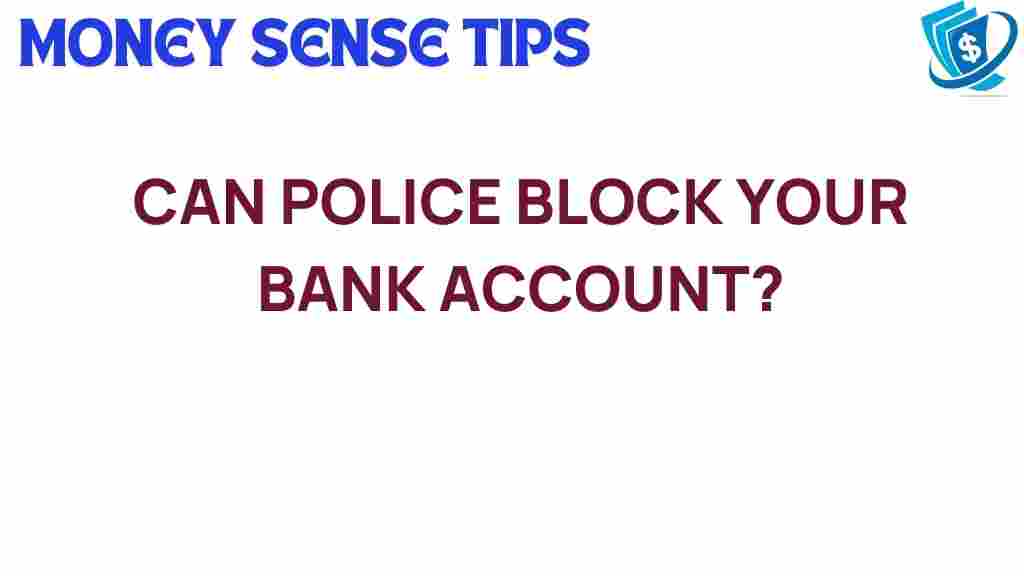Can Authorities Legally Freeze Your Bank Account? Understanding the Bank Account Freeze
In today’s financial landscape, understanding your rights and the powers of government intervention is crucial for maintaining financial security. One of the most alarming situations you might face is a bank account freeze. This article dives into the legal authority behind such actions, the implications for your finances, and what you can do if you find yourself in this situation.
What is a Bank Account Freeze?
A bank account freeze, also known as an account hold, occurs when a financial institution restricts access to your funds. This means you cannot withdraw money, make purchases, or perform any transactions using that account. While this may seem extreme, it is a legal measure that can be enforced under specific circumstances.
When Can Authorities Freeze Your Bank Account?
The legal authority to freeze your bank account typically comes from law enforcement agencies or court orders. Here are some common scenarios where a bank account freeze may occur:
- Tax Liens: If you owe back taxes, the government can place a lien on your account until the debt is settled.
- Legal Judgments: If a creditor takes you to court and wins, they may obtain a judgment that allows them to freeze your account.
- Fraud Investigations: If you are suspected of fraud or other criminal activities, law enforcement may freeze your account as part of their investigation.
- Child Support and Alimony: Authorities can freeze accounts to collect unpaid child support or alimony payments.
Understanding Legal Authority
The legal authority behind a bank account freeze varies by jurisdiction, but generally, it stems from laws that govern financial institutions and debt collection. Here are some key points to consider:
- **Court Orders:** Many freezes occur due to a court order, which mandates the bank to restrict access to the funds.
- **Government Regulations:** Certain government agencies have the authority to freeze accounts, particularly in cases of tax delinquency or criminal investigations.
- **Bank Policies:** Individual banks may have policies in place to freeze accounts if suspicious activity is detected.
Steps Authorities Take to Freeze Your Account
Understanding the steps taken by authorities can help you be more prepared. Here’s a general outline of the process:
- Investigation: Authorities investigate the reason for the freeze, such as unpaid debts or criminal activity.
- Obtain a Court Order: If necessary, they may seek a court order to legally freeze the account.
- Notification to the Bank: The court order or directive is sent to the bank, instructing them to freeze the account.
- Bank Action: The bank complies with the order, locking your account and preventing access to your funds.
Your Rights During a Bank Account Freeze
Being subjected to a bank account freeze can be distressing. However, it is essential to know your rights:
- Notification: Most jurisdictions require that you be notified of the freeze and the reason behind it.
- Right to Appeal: You may have the right to contest the freeze in court or appeal the decision.
- Access to Funds: In some cases, you may still have limited access to certain funds, particularly if they are needed for essential living expenses.
Financial Implications of a Bank Account Freeze
A bank account freeze can have several financial implications:
- Loss of Access to Funds: You cannot access your money, which can lead to missed payments and financial hardship.
- Impact on Credit Score: If the freeze is related to unpaid debts, it may negatively affect your credit score.
- Legal Fees: If you choose to contest the freeze, you may incur legal fees and other related costs.
What to Do if Your Bank Account is Frozen
If you find yourself facing a bank account freeze, follow these steps:
- Contact Your Bank: Find out the reason for the freeze and gather any relevant documentation.
- Review Your Rights: Understand your rights regarding the freeze and any notifications you should have received.
- Consider Legal Help: If the freeze is due to a legal judgment or government action, consult with a lawyer to discuss your options.
- Negotiate with Creditors: If the freeze is due to unpaid debts, consider negotiating a payment plan or settlement.
Troubleshooting Tips for Account Access Issues
While dealing with a bank account freeze, you may face additional challenges. Here are some troubleshooting tips:
- Keep Records: Document all communications with your bank and any authorities involved.
- Stay Informed: Monitor your credit report for any changes that may arise due to the freeze.
- Seek Consumer Advocacy: Organizations may assist you in understanding your rights and navigating the process.
The Importance of Consumer Awareness
Consumer awareness is vital in protecting yourself from unexpected financial situations, including a bank account freeze. Here are some tips to enhance your awareness:
- **Educate Yourself:** Understand the laws and regulations governing bank accounts in your jurisdiction.
- **Monitor Your Accounts:** Regularly review your bank statements for any unauthorized transactions or unusual activities.
- **Stay Updated:** Keep yourself informed about changes in laws that may affect your financial rights.
Conclusion
A bank account freeze can be a daunting experience, but understanding the legal authority behind it, your rights, and the implications for your financial security can empower you to take action. Stay informed, seek assistance when needed, and ensure that you are aware of your rights to navigate this challenging situation effectively.
For more information on financial rights and consumer protection, you can visit Consumer Financial Protection Bureau. If you need assistance with legal issues, consider consulting an attorney who specializes in consumer law.
By being proactive and understanding the ramifications of a bank account freeze, you can better protect your financial future and maintain control over your resources.
This article is in the category Security and created by MoneySenseTips Team
